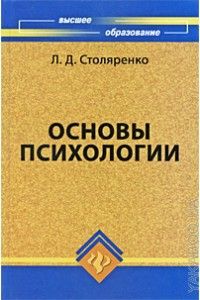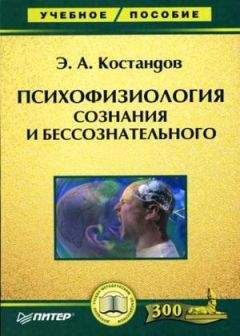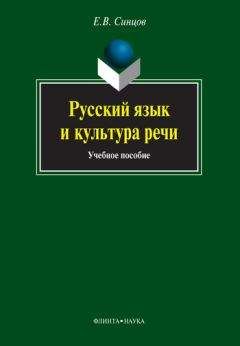Марина Холодная - Когнитивные стили. О природе индивидуального ума
Hunt E., Lunneborg C., Levis J. What does it mean to be high verbal? // Cognitive Psychology. 1975. V. 7. P. 194–227.
Hunt E. Intelligence as an information processing concept // British J. of Psychology. 1980. V. 71. P. 449–474.
Hunt E. On the nature of intelligence // Science. 1983. V. 219. № 4581. P. 141–146.
Isen A. V., Daubman K. A. The influence of effect on categorization // J. of Personality and Soc. Psychology. 1984. V. 47 (6). P. 1206–1217.
Jensen A. R., Rohwer W. D. The Stroop color-word test: A review // Acta Psychologica. 1966. V. 25. P. 36–93.
Kagan J., Moss H. A. From birth to maturity: A study in psychological development. Wiley, 1962.
Kagan J., Moss H. A., Sigel. Psychological significance of styles of thinking // J. G. Wright, J. Kagan (Eds.). Basic cognitive processes in children. Monograph Soc. Res. Child. Devel. 1963. V. 28 (2). P. 73–112.
Kagan J. Reflection-impulsivity: The generality and dynamics of conceptual tempo // J. of Abnorm. Psychology. 1966. V. 71. P. 17–24.
Kelly G. A. The psychology of personal constructs. Vols 1 and 2. Norton, N. Y., 1955.
Kepner M. D., Neimark E. D. Test-retest reliability and differential patterns of score chance on the Group Embedded Figures Test // J. of Personality and Soc. Psychology. 1984. V. 46 (6). P. 1405–1413.
Kirton M. J. Adaptors and Innovators. London: Routledge, 1994.
Klein G. S., Gardner R. W., Schlesinger H. Tolerance for unrealistic experiences: A study of the generality of cognitive behavior // Brit. J. of Psychology. 1962. V. 52 (1). P. 41–55.
Koch C. H., Cobell J., Roid G. Exploring individual differences in Stroop processing with cluster analysis // Psycholoquy. 1999. V. 10.
Kolb D. A. Learning Style Inventory: Technical manual. Englewood Cliffs, N.Y: Prentice-Hall, 1976.
Kolb D. A. Experimental learning: experience as a source of learning and development. Englewood Cliffs, N.Y: Prentice-Hall, 1984.
Laine M. Theoretical note on reflection – impulsivity // Psychol. Reports. 1982. V. 51 (1). P. 84.
Laing R. D. The politics of experience. London: Penguin, 1967.
LaPierre R. T. Attitudes vs. actions // Social Forces. 1934. V. 13. P. 230–237.
Larsen W. W. The relationship of reflection-impulsivity to intelligence and field dependence in older adults // J. of Personality. 1982. V. III (1). P. 31–34.
Lau S., Figguerres C., Davis J. K. Re-examination of the relationship between locus of control and field independence/dependence // Perc. and Motor Skills. 1981. V. 53. P. 555–561.
Laurence M. W., Arrowood A. J. Classification style differences in the elderly // Aging and cognitive processes. 1982. V. 8. P. 213–220.
Leckliter J. N., Matarazzo J. D., Silverstein A. B. A literature review of factor analytic studies of the WAIS-R // J. of Clin. Psychology. 1986. V. 42 (2). P. 332–342.
Letteri C. A. Cognitive profile: Basic determinant of academic achievement // J. of Educat. Research. 1980. V. 73. P. 195–199.
Leventhal H. Cognitive processes and interpersonal prediction // J. of Abnorm. and Soc. Psychol. 1957. V. 55. P. 176–180.
Leventhal H., Singer D. L. Cognitive complexity, impression formation and impression change // J. of Personality. 1964. V. 32. P. 210–226.
Linn M. C., Kyllonen P. The field dependence-independence construct: Some, one or none // J. of Educat. Psychology. 1981. V. 73 (2). P. 261–273.
Loo R., Cauthen N. R. Anxiety and perceptual articulation // Perc. and Motor Skills. 1976. V. 43. P. 403–408.
Lowe D. G. Further investigation on inhibitory mechanisms in attention // Memory and Cognition. 1985. V. 13. P. 74–80.
Lundy R. M., Berkowitz L. Cognitive complexity and assimilative projection in attitude change // J. of Abnormal and Soc. Psychology. 1957. V. 55. P. 34–37.
Maccoby E. E., Dowby E. M., Hagen J. M., Degerman R. Activity level and intellectual functioning in normal preschool children // Child Devel. 1965. V. 36. P. 761–770.
Marcus S., Catina A. Appreciative styles // Revue Roumaine des sciences sociales. Serie de Psychologie. 1977. V. 21 (22). P. 141–151.
Marton F. What does it take to learn? Some implication on an alternative view of learning // N. J. Entwhistle (Ed.). Strategies for research and development in higer education. Amsterdam: Swets and Zeitlenger, 1976. P. 200–222.
Massari D. The relation of reflection-impulsivity to field dependence-independence and internal-external control in children // J. of Genetic Psychology. 1975. V. 126. P. 61–67.
McKenna F. R. Measures of field dependence: Cognitive style or cognitive ability? // J. of Personality and Soc. Psychology. 1984. V. 47 (3). P. 593–603.
McKinney J. D. Problem-solving strategies in impulsive and reflective second grades // Devel. Psychology. 1973. V. 8. P. 145–178.
McLeod C. M., Jackson R. A., Palmer J. On the relation between spatial ability and field dependence // Intelligence. 1986. V. 10. P. 141–151.
Messick S., Kogan N. Differentiation and compartmentalization in object-sorting measures categorizing-style // J. of Personality. 1963. V. 16. P. 47–51.
Messick S., Kogan N. Personality consistencies in judgement: dimension of role constructs //Multivar. Behav. Research. 1966. V. 1. P. 165–175.
Messer B. Reflection-Impulsivity: A review // Psychol. Bulletin. 1976. V. 83 (6). P. 1026–1052.
Miller A., Wilson P. Cognitive differentiation and integration: A conceptual analysis // Genetic Psychology Monographs. 1979. V. 99. P. 3–40.
Miller A. Cognitive styles: An integrated model // Educat. Psychology. 1987. V. 7. P. 251–268.
Moore D. M., Dwyer R. E. Effect of cognitive style on test type (visual or verbal) and color coding // Perc. and Motor Skills. 1994. V. 79. P. 1532–1534.
Myers I. B. The Myers-Briggs Type Indicator. Palo Alto, CA: Consulting Psychologist’s Press, 1962.
Naish L. N. The locus of the Stroop effect: One site masquerading as two? // Brit. J. of Psychology. 1985. V. 76. P. 303–310.
Neimark E. D. Longitudinal development of formal operations thought // Genetic Psychol. Monogr. 1975. V. 91. P. 171–225.
Neimeyer R. A., Neimeyer G. J. Conceptual differentiation, integration and empatic prediction // J. of Personality. 1983. V. 51 (2). P. 185–191.
Niaz M. Mobility-fixity dimension in Witkin’s theory of field-dependence/independence and its implication for problem solving in science // Perc. and Motor Skills. 1987. V. 65 (3). P. 755–764.
Noppe L. D. The relationship of formal thought and cognitive styles to creativity // J. of Creative Behaviour. 1985. V. 19 (2). P. 88–96.
Nosal Ch.S. Psychologiczne modele umysłu. Warszawa: Państwowe Wydawnictwo Naukowe, 1990.
O’Connor K. P., Blowers G. H. Cognitive style, set and sorting strategy // Brit. J. of Psychology. 1980. V. 71 (1). P. 17–22.
Oliver J. M., McGee J. Cognition as a function of depression in a student population: Content and complexity of cognition // Cognitive Therapy and Research. 1982. V. 6 (3). P. 275–286.
Orford J. Simplistic thinking about other people as a predictor of early drop-out at an alcoholism halfway haus // British J. of Medical Psychology. 1974. V. 47 (1). P. 53–62.
O’Sullivan M. et al. The measurement of social intelligence. Los Angeles, 1965.
Pascual-Leone J., Goodman D. Intelligence and experience: A neo-Piagetian approach // Instructional Science. 1979. V. 8. P. 301–367.
Pettigrew T. F. The measurement and correlates of category width as a cognitive variable // J. of Personality. 1958. V. 26. P. 532–544.
Piskors Z. Conceptual category width and content of categorization // Polish Psychol. Bull. 1989. V. 20 (1). P. 25–32.
Plomin R., Buss A. H. Reflection – impulsivity and intelligence // Psychol. Reports. 1973. V. 33 (3). P. 726.
Rapoport D. Cognitive structures // J. S. Bruner et al. (Eds.). Contemporary approaches to cognition. Cambridge: Harvard Univ. Press, 1957.
Rayne S. K., Beatty M. J. Innovativeness and cognitive complexity // Psychol. Reports. 1982. V. 51 (1). P. 85–86.
Rayner S., Riding R. Towards a categorisation of cognitive styles and learning styles // Educat. Psychology. 1997. V. 17 (1 and 2). P. 5–27.
Reinert H. One picture is worth a thousand words? Not necessarily! // Modern Language J. 1976. V. 60. P. 160–168.
Renninger K. A., Snyder S. S. Effects of cognitive style on perceived satisfaction and performance among students and teachers // J. of Educat. Psychology. 1983. V. 75 (5). P. 668–678.
Ribaupierre A. Cognitive style and operational development: A review of french literature and a neo-Piagetian reinterpretation // T. Globerson, T. Zelniker (Eds.). Cognitive style and cognitive development. Norwood, New Jersey, 1988. P. 86–115.
Richardson A. Verbalizer-Visualizer: A cognitive style dimension // J. of Mental Imagery. 1977. V. 1. P. 109–125.
Riechmann S. W., Grasha A. F. A rational approach to developing and assessing the validity of a student learning styles instrument // J. of Psychology. 1974. V. 87. P. 213–223.
Riding R. J., Cheema I. Cognitive style – an overview and integration // Educat. Psychology. 1991. V. 11. P. 193–215.
Riding R. J. On the nature of cognitive style // Educat. Psychology. 1997. V. 17 (1 and 2). P. 29–49.
Riemann B. C., McNally R. J. Cognitive processing of personality relevant information // Cognition and Emotion. 1995. V. 9 (4). P. 325–340.
Rotter J. B. Generalized expectancies for internal versus external control of reinforcement // Psychological Monograph. 1966. V. 80. No. 609.
Ross J. Three cognitive dimensions // Psychol. Reports. 1965. V. 17 (1). P. 291–300.
Royce J. R. Cognition and knowledge: Psychological epistemology // E. C. Carterette, M. P. Friedman (Eds.). Handbook of perception. V. I. N. Y., London: Acad. Press, 1974. P. 149–176.
Rozestraten R. J., Pottier A. Educational levels and field-dependent/ independent perceptual style // Bull. Psychonom. Soc. 1988. V. 26 (3). P. 212–213.
Rush G. M., Moore D. M. Effect of restructuring training and cognitive style // Educat. Psychology. 1991. V. 11. P. 309–321.
Sabatelli R. M. Cognitive style and relationalship quality in married dyads // J. of Personality. 1983. V. 51 (2). P. 192–201.
Santostefano S. Biodevelopmental approach to clinical child psychology. N. Y.: John Wiley, 1978.
Santostefano S., Rieder C. Cognitive controls and agression in children: The concept cognitive-affective balance // J. of Consulting and Clinical Psychology. 1984. V. 52 (1). P. 46–56.
Satterly D. J. Cognitive styles, spatial ability and school achievement // J. of Educat. Psychology. 1976. V. 68 (1). P. 36–42.
Schatterman A., Couder J., Carette E., Eisendrath H. Understanding the effect of a process-oriented instruction in the first year of the university by investigating learning style characteristics // Learning Style Conference: University of Birmengham, 1996.
Schroder H. M., Driver M. J., Streufert S. Levels of informations processing // P. B. Warr (Ed.). Thought and Personality. Baltimor, 1970. P. 174–191.
Shneier C. E. Measuring cognitive complexity: developing reliability, validity and norm tables for personality instrument // Educat. and Psychol. Measurement. 1979. V. 39. P. 599–612.
Shoucksmith G. Intelligence, creativity and cognitive style. N. Y.: Wiley-Interscience, Inc., 1970.
Silverman A. J. at al. Some relationships between handedness and perception // J. of Psychosomatic Research. 1966. V. 10. P. 151–158.
Stasz C., Shavelson R., Cox D. Field independence and the structuring of knowledge in social studies minicourse // J. of Educat. Psychology. 1976. V. 68. P. 550–558.
Sternberg J. R. Mental self-government: A theory of intellectual styles and their development // Human Development. 1988. V. 31. P. 197–221.
Sternberg J. R. Intellectual styles: Theory and classroom implications // Learning and thinking styles: Classroom interaction. / B. Z. Presseisen (Ed.). Washington, DC: Nat. Educ. Association, 1990. P. 18–42.
Sternberg R. J. Thinking styles. Cambridge: Cambridge Univ. Press, 1998.
Stroop J. R. Studies of interference in serial verbal reactions // J. of Exper. Psychology. 1935. V. 18. P. 643–662.
Tajfel H., Richardson A., Everstine L. Individual consistencies categorizing: A study in judgement behavior // J. of Personality. 1964. V. 32. P. 90–108.
Tinajero C., Paramo M. F., Cadaveira F., Rodriguez-Holguin S. Field dependence-independence and brain organization: the confluence of two different ways of describing general forms of cognitive functioning? A theoretical review // Perc. and Motor Skills. 1993. V. 77. P. 787–802.
Vernon P. E. The distinctiveness of field independence // J. of Personality. 1972. V. 40. P. 366–391.
Wachtel P. Field-dependence and psychological differentiation: A reexamination // Pers. and Motor Skills. 1972. V. 35. P. 179–189.
Wallach M. A. Commentary: Active-analitical vs. passive-global cognitive functioning // S. Messick, J. Ross (Eds.). Measurement in personality and cognition. N. Y., London, 1962. P. 199–216.
Wardell D. M., Royce J. R. Toward a multi-factor theory of styles and their relatoinship to cognition and affect // J. of Personality. 1978. V. 46 (3). P. 474–505.
Widiger T. A., Knudson R. M., Rover L. G. Convergent and discriminant validity of measures of cognitive styles and abilities // J. of Personality and Soc. Psychology. 1980. V. 39. P. 116–129.
Wingrove A. J., Bond A. J. Impulsivity: A state as well as trait variable. Does mood awareness explain low correlations between trait and behavioral measures of impulsivity? // Person. and Individ. Diff. 1997. V. 22 (3). P. 333–339.



